Deja Watkins
StarTalk
By Deja Watkins
 I have been learning Chinese for a little over five years now. I started learning Chinese when I first entered Enloe High School and continued learning Chinese there until I graduated. I continued to take Chinese classes at my current university. I like learning about the cultures of others, and I wanted to learn about Chinese culture. Because of this interest, I was really excited to find out that the high school I was going to attend offered Chinese. It was through my Chinese class at Enloe that I learned about the Confucius Institute. There were resources and events in class that was provided by the Confucius Institute at North Carolina State University. For example, Chinese students from NC State who came by my high school classroom to give a presentation on China and their experiences being in the United States. I was able to speak with a couple of the students and learn more about them. I also participated in the Chinese club that was offered at Enloe. Through the Chinese club, and in class, I participated in various events and festivals such as the Mid-Autumn Festival. There were even days where my teacher brought in Chinese food for the class to try. I even began to participate in the annual Chinese New Year Festival in Raleigh, where I saw various cultural performances and many exhibits.
I have been learning Chinese for a little over five years now. I started learning Chinese when I first entered Enloe High School and continued learning Chinese there until I graduated. I continued to take Chinese classes at my current university. I like learning about the cultures of others, and I wanted to learn about Chinese culture. Because of this interest, I was really excited to find out that the high school I was going to attend offered Chinese. It was through my Chinese class at Enloe that I learned about the Confucius Institute. There were resources and events in class that was provided by the Confucius Institute at North Carolina State University. For example, Chinese students from NC State who came by my high school classroom to give a presentation on China and their experiences being in the United States. I was able to speak with a couple of the students and learn more about them. I also participated in the Chinese club that was offered at Enloe. Through the Chinese club, and in class, I participated in various events and festivals such as the Mid-Autumn Festival. There were even days where my teacher brought in Chinese food for the class to try. I even began to participate in the annual Chinese New Year Festival in Raleigh, where I saw various cultural performances and many exhibits.
Through the Confucius Classroom at Enloe, I was able to travel to Troy University to participate in the StarTalk program. I participated in the StarTalk program for two summers and thoroughly enjoyed my time in the program. Through this, I was able to improve my Chinese speaking skills and learn more about Chinese culture. For example, I learned how to lion dance, dragon dance, and umbrella dance. I even learned how to do a little bit of Taiji. I met other students from different parts of the United States who had the same interest in Chinese as I did, which really helped me to learn Chinese culture and language skills that I did not know before. It was wonderful to even be able to learn other cultural activities from my teachers, such as calligraphy and Chinese chess. The Cultural Presentation, or Fashion Show, at the end of the program, was really interesting as everyone dressed up as one of the many minorities in China. Before then I had only heard of a few minorities such as Tibetan and Manchu, but during I learned about many others.
The Enloe Confucius Classroom, of the NCSU Confucius Institute, has changed my life in many ways. Before learning Chinese with the Confucius Classroom at Enloe, I only had knowledge about American culture. The Confucius Classroom has also helped me to prepare for college. When I entered college, I was able to connect with the Confucius Institute at my school and continue to build my knowledge of Chinese language and culture. The Confucius Classroom truly helped me start my education of Chinese culture and language as well as provided me resources as to what I can do to improve my abilities. I have connected with many people, including Chinese teachers and friends, whom I still continue to stay in touch with long after we parted ways to return back to our respective homes. I have met so many kind people who have been more than helpful and patient in teaching me Chinese. I honestly could not have asked for a better experience. Everyone I have met has been very respectful and eager to aid me in any way possible throughout my entire experience in learning Chinese. I happily look forward to improving my fluency in Chinese, participating in more activities and events, and continuing to be part of the Confucius Institute.

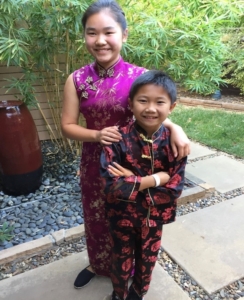 I was born in Fuling, China. Chinese was the only language I knew. Twelve months after I was born, I was adopted by two Americans who spoke a language that was foreign. They brought me back to America where their language became familiar to me.
I was born in Fuling, China. Chinese was the only language I knew. Twelve months after I was born, I was adopted by two Americans who spoke a language that was foreign. They brought me back to America where their language became familiar to me.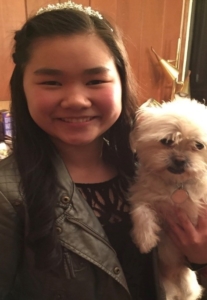
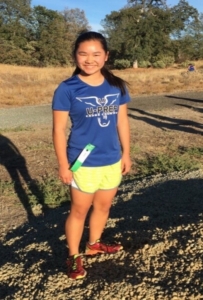 I switched to a different school for junior high and with the new school came a new Confucius Classroom. My new teacher took us to Chinatown in San Francisco for the annual New Year’s Parade. It was amazing to experience the culture in person instead of from a textbook. We were sent into Chinatown with a list of things to find for a scavenger hunt. This gave us a reason to talk to the street shop owners and use our language skills. The town was decorated festively with lanterns and even a statue of Monkey King (孙悟空). I especially liked throwing poppers on the ground and surprising everyone around me. We also toured the Asian Art Museum and expanded our knowledge of Chinese art. When it came time for the parade, my classmates and I sat enthusiastically on the edge of the sidewalk munching on goodies we had just bought in Chinatown. The parade was great! All the floats were lavishly adorned, the bands played fun songs, and the firecrackers were a bundle of exhilaration. Not only has Chinese class been my passion, but it has also opened doors to new adventures.
I switched to a different school for junior high and with the new school came a new Confucius Classroom. My new teacher took us to Chinatown in San Francisco for the annual New Year’s Parade. It was amazing to experience the culture in person instead of from a textbook. We were sent into Chinatown with a list of things to find for a scavenger hunt. This gave us a reason to talk to the street shop owners and use our language skills. The town was decorated festively with lanterns and even a statue of Monkey King (孙悟空). I especially liked throwing poppers on the ground and surprising everyone around me. We also toured the Asian Art Museum and expanded our knowledge of Chinese art. When it came time for the parade, my classmates and I sat enthusiastically on the edge of the sidewalk munching on goodies we had just bought in Chinatown. The parade was great! All the floats were lavishly adorned, the bands played fun songs, and the firecrackers were a bundle of exhilaration. Not only has Chinese class been my passion, but it has also opened doors to new adventures.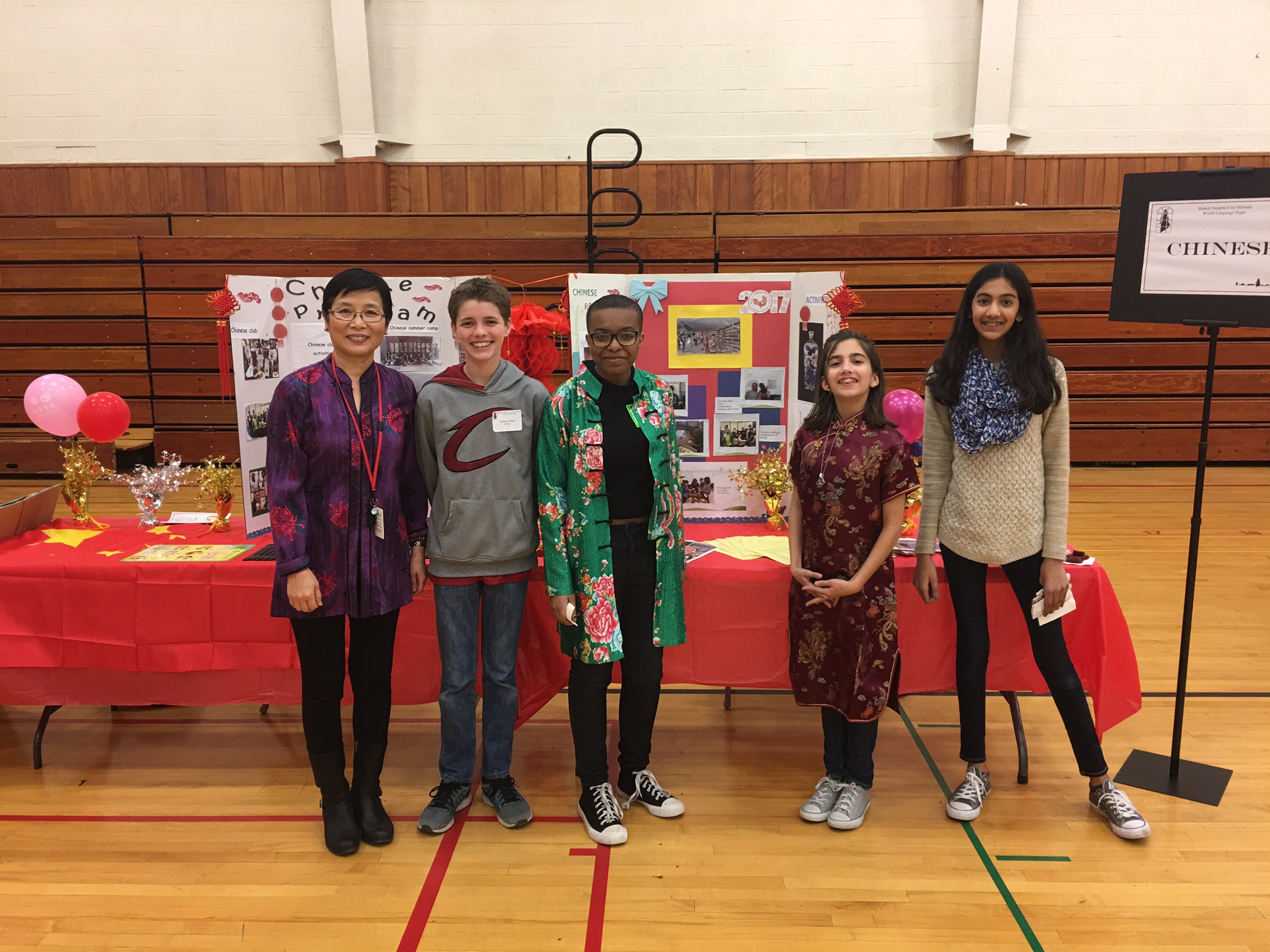
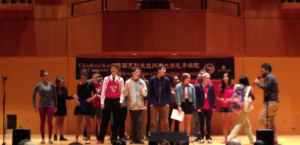 As a junior in Mandarin IV, my class has the highest level of proficiency in the school. Because of this, we were responsible for producing our school’s performance for the festival. My teacher gave me the privilege of coming up with the concept and theme, along with directing our play. I was extremely excited because the Confucius Festival is how all the Chinese classes in the Cleveland area see what other students are learning and it gave my Chinese-learning friends from other schools the opportunity to see my work on stage. Because my classmates and I collectively love the music from the 2008 Beijing Olympics, I decided we would recreate that moment on stage. We all represented different athletes and performed a closing ceremony skit where students gave speeches, showed off Olympic medals, sang and danced— all in Chinese.
As a junior in Mandarin IV, my class has the highest level of proficiency in the school. Because of this, we were responsible for producing our school’s performance for the festival. My teacher gave me the privilege of coming up with the concept and theme, along with directing our play. I was extremely excited because the Confucius Festival is how all the Chinese classes in the Cleveland area see what other students are learning and it gave my Chinese-learning friends from other schools the opportunity to see my work on stage. Because my classmates and I collectively love the music from the 2008 Beijing Olympics, I decided we would recreate that moment on stage. We all represented different athletes and performed a closing ceremony skit where students gave speeches, showed off Olympic medals, sang and danced— all in Chinese.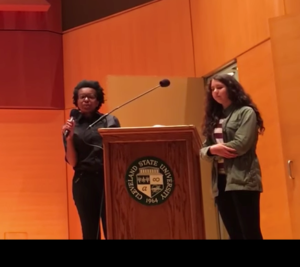 I remember when I was 11 years old at my first Confucius Festival and I did not have the language proficiency to comprehend most of the dialogue and jokes or the cultural awareness to recognize any of the stories and songs. I can look back on that moment and compare it to now as I perform skits in Mandarin, talk to Chinese students about jokes that do not quite translate to English and talk to my friends about our favorite Chinese songs and foods. Each October it is nice to go down to Cleveland State and see how much more information I can ascertain. I was excited this year because I recognized a lot of the stories the elementary students acted out. Most notably, a group of children acted out the race to determine the 12 Chinese zodiac animals and I remember translating that story into English in my class.
I remember when I was 11 years old at my first Confucius Festival and I did not have the language proficiency to comprehend most of the dialogue and jokes or the cultural awareness to recognize any of the stories and songs. I can look back on that moment and compare it to now as I perform skits in Mandarin, talk to Chinese students about jokes that do not quite translate to English and talk to my friends about our favorite Chinese songs and foods. Each October it is nice to go down to Cleveland State and see how much more information I can ascertain. I was excited this year because I recognized a lot of the stories the elementary students acted out. Most notably, a group of children acted out the race to determine the 12 Chinese zodiac animals and I remember translating that story into English in my class.